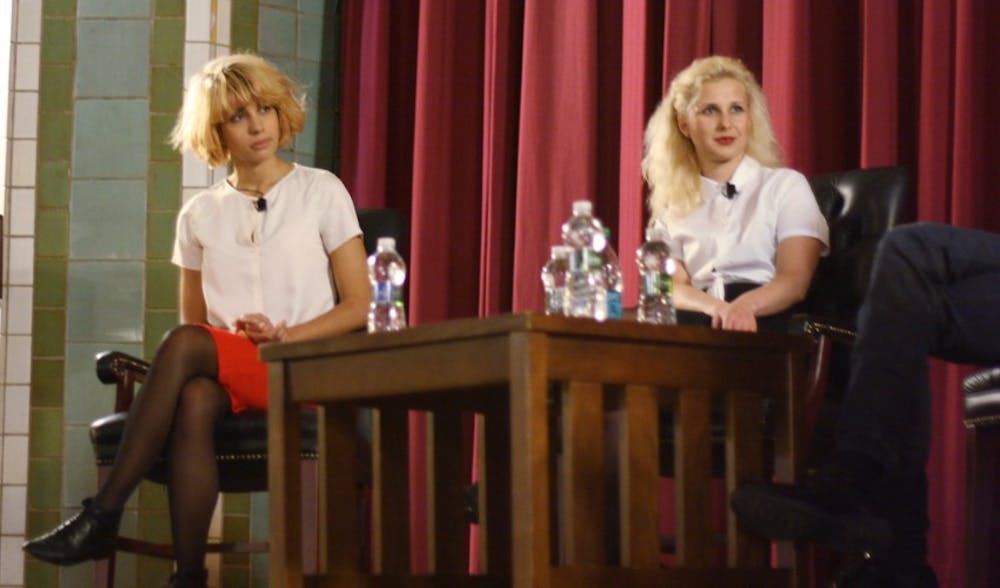The faces of the Russian counterculture took the floor last night.
The Slavic Languages Department and Perry World House brought Maria Alyokhina and Nadezhda Tolokonnikova, two of the founders of the Russian band Pussy Riot, to Penn for a question and answer session on Tuesday. Pussy Riot is an all-female, feminist, anti-Putin punk band that advocates for oppressed groups through their provocative performances and lyrics. Pussy Riot seeks to use art as a vehicle through which they can enact change and impact the way people think about culture, politics and social issues in Russia and around the world.
“It’s strange to separate performance and activism ... In terms of how human beings perceive issues, it is odd to separate two forms of thoughts,” Alyokhina and Tolokonnikova said.
The group made an appearance in the third season of House of Cards, which premiered on Netflix in February. Pussy Riot also released their first English song last month.
To begin the session, William Burke-White, the director of the future Perry World House at Penn, showed two of the band’s most famous videos: “Punk Prayer” and “I Can’t Breathe.” In the Punk Prayer video, the band members dance in Moscow’s Cathedral of Christ the Savior to protest the Church’s support of Putin in the last election.
During that performance, the members were arrested by the Moscow Police. As a result, both Alyokhina and Tolokonnikova were sentenced to two years in prison in 2012. Since then, “Punk Prayer,” which addresses both universal concerns and events in Russia, has been dubbed one of the most successful pieces of art activism.
The second video shown, “I Can’t Breathe,” depicted Alyokhina and Tolokonnikova being buried alive.
“[The video] speaks to our emotions ... the feeling of wanting to talk and scream and change something but you do not know what to do, as if you do not have enough air,” Alyokhina and Tolokonnikova said.
Through the scene, Alyokhina and Tolokonnikova also pay tribute to Eric Garner, a man who died while being arrested by New York City police. “I can’t breathe” were reportedly the last words said by Garner.
“We are not focused on something specific ... In December, we came to New York to film a video against the war in Ukraine but found ourselves among protestors of the Eric Garner case,” they said. “The fact that we decided to include an issue that does not relate to our country comes from people we met in our travels.”
Becoming familiar with the Eric Garner case compelled Pussy Riot to speak out against police brutality in the United States. Alyokhina and Tolokonnikova said that in the U.S., politicians feel that their actions are “watched” or monitored by the media whereas policemen are not.
“Law enforcement believes that they are in a blank space and cannot be touched ... They should be touched ... All bodies need to feel watched,” they said.
In addition to protesting human rights abuses and expressing discontent for certain sociopolitical structures in both the states and Russia, Pussy Riot intends to restore meaning to music. Both Alyokhina and Tolokonnikova contend that music should be reflective of and make profound insights into the sociopolitical situation of the given time period.
“We started Pussy Riot to inspire musicians to do political things ... because we feel that music has lost its value,” Alyokhina and Tolokonnikova said.
Alyokhina and Tolokonnikova acknowledge that the messages of their videos are often subjective and can be viewed in a variety of ways. Such an effect is inevitable, however, when their work relates to various parts of the population.
“We are very against a single meaning ... We like when people take issues and give them their own meaning,” they said.
Despite the repercussions of their often controversial actions, Pussy Riot chooses to never censor themselves.
“If we personally feel there is an issue we can’t be silent about, we have to act no matter the consequences ... only thing you can do is speak out loud, as loud as you can about the things that should be changed,” Alyokhina and Tolokonnikova said.



